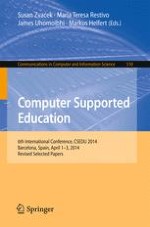2015 | OriginalPaper | Buchkapitel
Vygotsky Based Sequencing Without Domain Information: A Matrix Factorization Approach
verfasst von : Carlotta Schatten, Ruth Janning, Lars Schmidt-Thieme
Erschienen in: Computer Supported Education
Aktivieren Sie unsere intelligente Suche, um passende Fachinhalte oder Patente zu finden.
Wählen Sie Textabschnitte aus um mit Künstlicher Intelligenz passenden Patente zu finden. powered by
Markieren Sie Textabschnitte, um KI-gestützt weitere passende Inhalte zu finden. powered by
